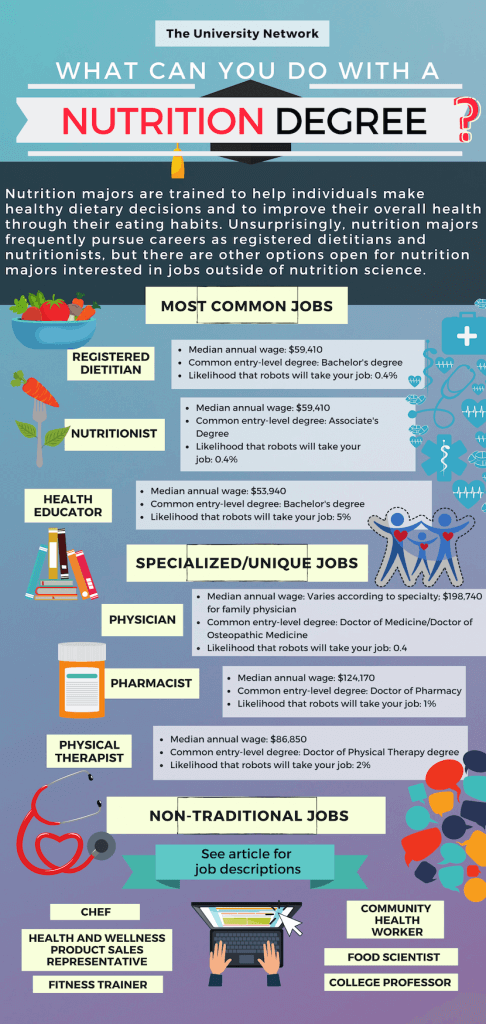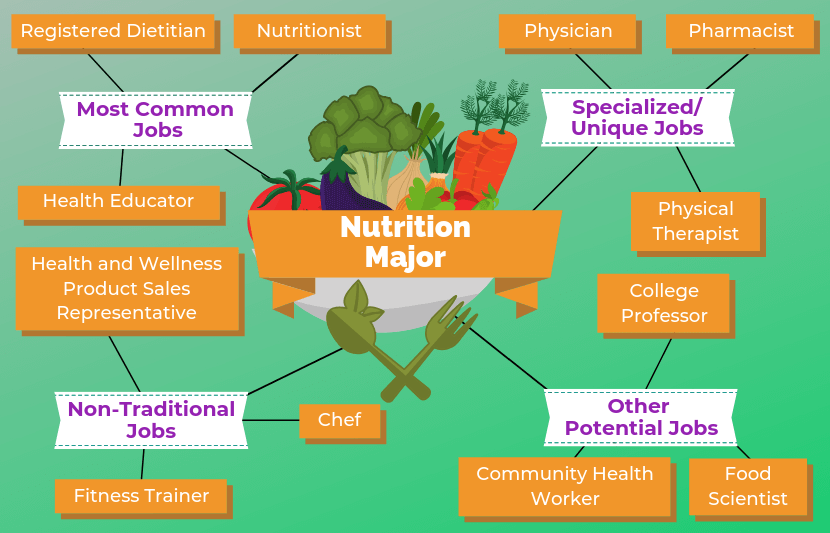Nutrition majors are trained to help individuals make healthy dietary decisions and to improve their overall health through their eating habits. Unsurprisingly, nutrition majors frequently pursue careers as registered dietitians and nutritionists, but there are other options open for nutrition majors interested in jobs outside of nutrition science. Nutrition majors can pursue careers in other fields of medicine, health education, or the health food industry. Alternatively, some might want to take their nutritional expertise into the kitchen.
Here’s a list of 12 jobs for nutrition majors:
Most Common Jobs for Nutrition Majors
1. Registered Dietitian
Registered dietitians (RDs), also called registered dietitian nutritionist (RDN), are credentialed nutrition experts who work directly with patients in clinical settings, advising them on their dietary choices and overall health based on their specific health needs. RDs treat patients with chronic conditions with medical nutrition therapy (MNT), evidence-based nutrition plans specially-catered to the patient’s unique health condition. The majority of RDs work in hospitals, outpatient care centers, and private practices. Others may work in government as public policy advisors. The RD and RDN credentials are effectively the same; in practice, RDs and RDNs perform the same job. In order to become an RD or RDN, you will need at least a bachelor’s degree in nutrition or a related subject. You will also need to complete an internship accredited by the Accreditation Council for Education in Nutrition and Dietetics (ACEND) and pass the Commission on Dietetic Registration (CDR) exam.
Median annual wage: $59,410
Common entry-level degree: Bachelor’s degree
Likelihood that robots will take your job: 0.4%
2. Nutritionist
Like RDs, nutritionists advise patients and clients on dietary practices and overall health. Unlike RDs, nutritionists do not need to be credentialed and often do not work in clinical settings. “Nutritionist” is a broader term than RD, which implies a broader concept of health. They often work in non-clinical or non-medical settings, and may fall under the banner of alternative or holistic medical practitioners. Some nutritionists are public figures who advocate for dietary practices. Some states require individuals to be licensed or credentialed in order to use the title of “nutritionist,” the requirements for which vary based on the state and specific license. In other states, there are no requirements to use the title of “nutritionist” and the profession is more or less unregulated. Aspiring nutritionists should be advised to earn at least an associate’s degree.
Median annual wage: $59,410
Common entry-level degree: Associate’s degree
Likelihood that robots will take your job: 0.4%
3. Health Educator
Health educators teach individuals and groups about health and wellness practices, providing general information and advice about leading a healthy lifestyle, avoiding dangerous behaviors, and nutrition. Health educators may also design and teach health and wellness classes, write books or pamphlets about health practices, and even work with patients to create health treatment plans. Most health educators need at least a bachelor’s degree. Health educators may also choose to become Certified Health Education Specialists (CHES), a credential that is earned through the completion of an exam.
Median annual wage: $53,940
Common entry-level degree: Bachelor’s degree
Likelihood that robots will take your job: 5%

Specialized/Unique Jobs for Nutrition Majors
4. Physician
Nutrition majors who are prepared to run the gauntlet of medical school can become physicians. Physicians, or medical doctors, are professionals who examine and diagnose patients and treat injury and illness. The term “physician” refers to a wide range of medical practitioners that may include family and general doctors who treat a range of everyday conditions and illnesses, pediatricians who treat children and young adults, general internists who provide nonsurgical treatment for problems that affect internal organs, or a wide variety of specialists who have expertise and treat specific organs or conditions. Becoming a physician requires a lot of time and hard work. After you get your bachelor’s degree, you’re going to need to take the Medical College Admissions Test (MCAT), attend medical school for 4 years and earn a medical degree, and then complete a residency program, which typically takes 3-7 years depending on your specialty.
Median annual wage: Varies according to specialty; $198,740 for family physician
Common entry-level degree: Doctor of Medicine/Doctor of Osteopathic Medicine
Likelihood that robots will take your job: 0.4%
5. Pharmacist
A nutrition major, with its emphasis on biology, chemistry and health science, can be solid preparation for a career as a pharmacist. Pharmacists are responsible for providing patients with prescription drugs, educating patients about the use of medications, and communicating with doctors about medication interactions and issues. In order to become a pharmacist, you will need to hold a Doctor of Pharmacy degree. These programs typically take 4 years and require a minimum requisite of 2 years of undergraduate study (though some may require a bachelor’s degree).
Median annual wage: $124,170
Common entry-level degree: Doctor of Pharmacy
Likelihood that robots will take your job: 1%
6. Physical Therapist
Physical therapists work with patients to recover from physical injuries or illnesses, assisting them so that they can gradually regain control over their bodies and pain. Although a nutrition major won’t set you up directly for a career in physical therapy, it can serve as an entry point to a physical therapy doctoral program, and physical therapists are increasingly incorporating principles of nutrition and dietetics into their practices. Becoming a physical therapist requires advanced training. You’ll need to complete a Doctor of Physical Therapy degree program, which typically takes 3 years. Many also complete a clinical residency program, which typically takes about a year.
Median annual wage: $86,850
Common entry-level degree: Doctor of Physical Therapy degree
Likelihood that robots will take your job: 2%
Non-Traditional Jobs for Nutrition Majors
7. Chef
Nutrition majors who are uninterested in a career in medicine might want to consider a career in the culinary arts. A nutrition major can provide a chef with the tools to create delicious and nutritious dishes. In particular, aspiring chefs who are interested in creating meals for people with specific dietary needs (professional athletes or sick people, for example) should consider studying nutrition. Although most chefs learn their trade by working their way up in a kitchen, cooks in high-end restaurants may have culinary school degrees. For those who are specifically interested in working at the intersection of cooking and nutrition, some schools offer culinary nutrition bachelor’s degree programs, which combine a traditional nutrition education with culinary training.
Median annual wage: $45,950
Common entry-level degree: None required
Likelihood that robots will take your job: 10%
8. Health and Wellness Product Sales Representative
Nutrition majors who have an interest in sales might choose to pursue a job as a health and wellness product sales representative. In this role, you might work for a variety of companies that produce health and wellness products, such as vitamins, nutritional supplements, exercise products, or even pharmaceuticals. Typically, employers look for candidates with some level of knowledge about their product or area of business. Becoming a sales representative only requires a bachelor’s degree, though some may choose to pursue further education in marketing or business.
Median annual wage: $56,970
Common entry-level degree: Bachelor’s degree
Likelihood that robots will take your job: 85%
9. Fitness Trainer
Fitness trainers lead group fitness classes and provide private fitness training and advice to individuals. Fitness trainers may lead a variety of exercise classes, such as cardiovascular exercise, strength training, stretches, aerobics, and more. They also often provide guidance related to injury prevention, nutrition and general health. There is not always an educational requirement to become a fitness trainer, though many employers, including gyms and exercise facilities, increasingly seek out applicants with bachelor’s degrees in health-related subjects.
Median annual wage: $39,210
Common entry-level degree: Bachelor’s degree
Likelihood that robots will take your job: 9%
Other Potential Jobs for Nutrition Majors
10. Community Health Worker
Community health workers (CHWs) are individuals who work to promote health within their communities. A broad umbrella term, community health work refers to a range of activities and programs that are catered to the specific needs of the community. Community health workers may lead outreach efforts, provide informal counseling, promote health education, help members of their community access health care, and offer basic health care services like first aid care. Education requirements vary based on the location and specific position. Some positions are open to those with high school diplomas, although advancement to senior and management positions typically requires postsecondary education and often a bachelor’s degree.
Median annual wage: $38,370
Common entry-level degree: High school diploma/Bachelor’s degree
Likelihood that robots will take your job: N/A
11. Food Scientist
Food scientists work in agriculture, studying and developing methods to improve the productivity or sustainability of crops and livestock. Food scientists may specialize in a subfield, such as soil, plants, or livestock. They may also work as food technologists, developing new food products, packaging techniques, or methods of detecting contaminants. A bachelor’s degree in nutrition with coursework in biology, chemistry and engineering can be enough to break into the field, but acquiring a master’s degree in food science or a related field is recommended.
Median annual wage: $63,660
Common entry-level degree: Bachelor’s degree/Master’s degree
Likelihood that robots will take your job: 8%
12. College Professor
Some nutrition majors may want to stay within academia and pursue a career as a professor of nutrition. If you are interested primarily in nutrition research, this can be an ideal career option. Nutrition professors have the opportunity to educate and nurture the next generation of dietitians while also conducting their own research and contributing to their field. To earn a job teaching at the postsecondary level, you will need at least a master’s degree. In order to attain a full tenure-track professorship, you will need a doctorate.
Median annual wage: $67,140
Common entry-level degree: Master’s degree/Doctoral degree
Likelihood that robots will take your job: 3%
10 Famous People Who Studied Nutrition
- Joy Bauer, nutritionist and TV personality
- Frank Hu, nutrition and diabetes researcher
- Zheng Ji, nutritionist and biochemist
- Ellie Krieger, celebrity chef and registered dietitian
- Ian Marber, nutrition therapist
- Robin Miller, celebrity chef and food writer
- Marion Nestle, academic and public health advocate
- Mila Rechcigl, nutritionist and biochemist
- Jane Thornthwaite, Canadian politician
- Robb Wolf, celebrity nutritionist
To explore options for other majors, click here.



